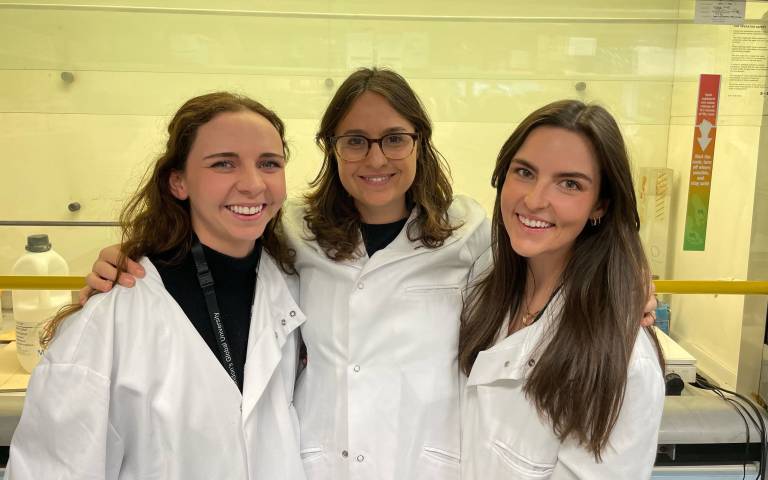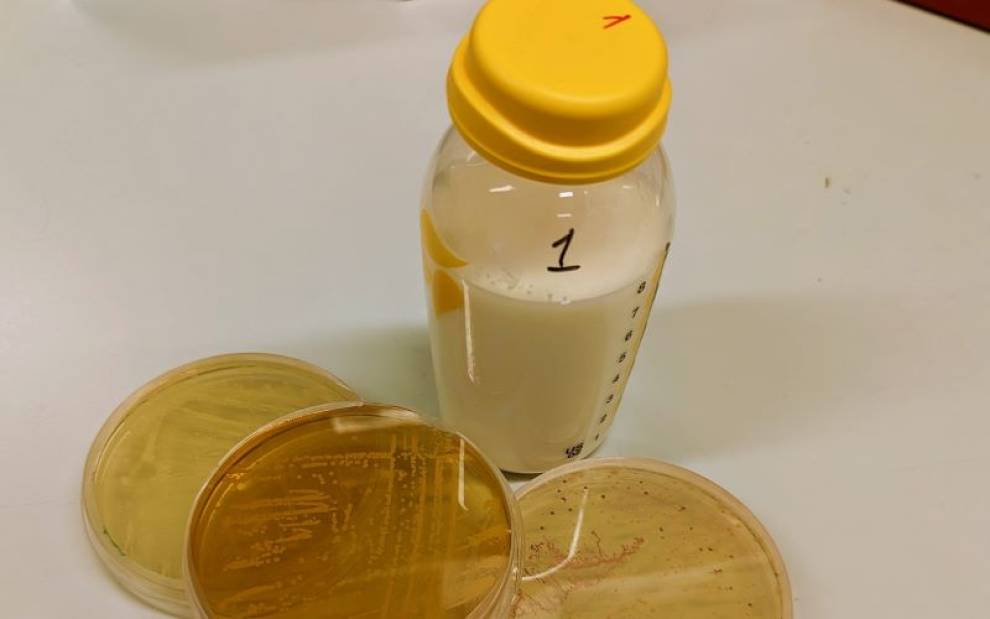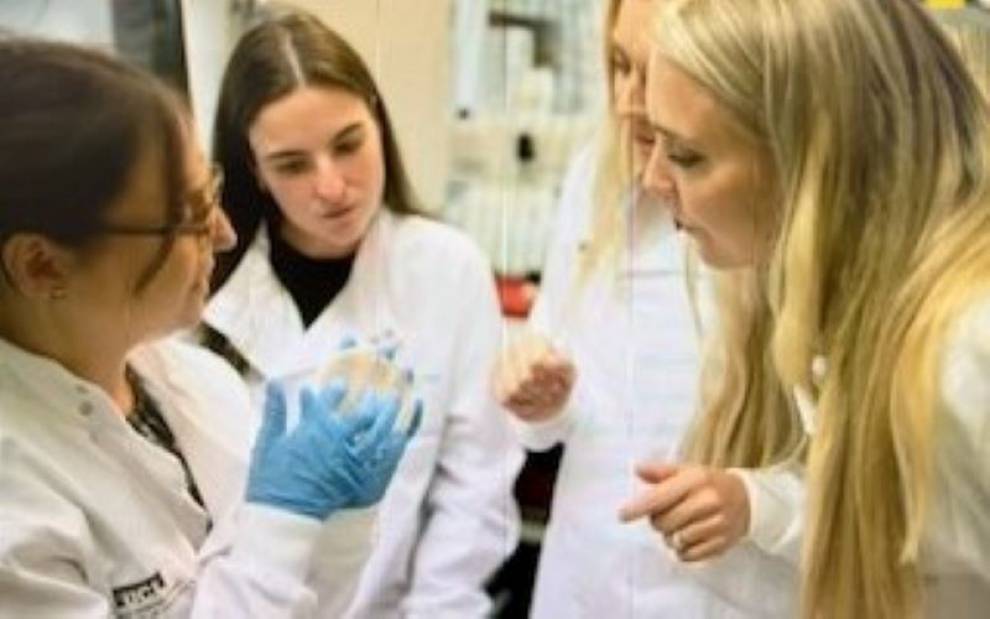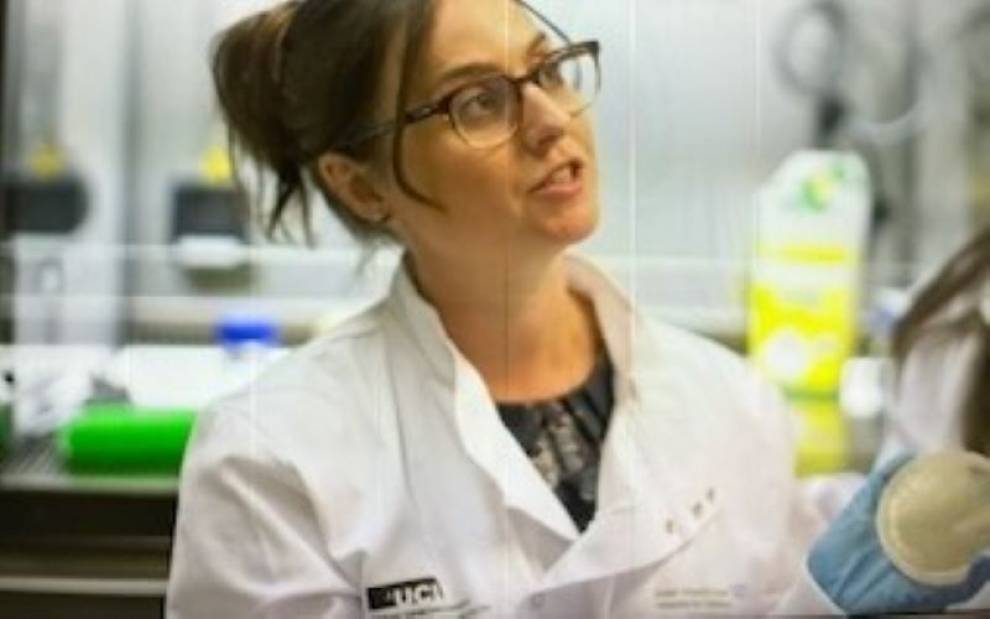Feature: Breast milk, super donors and gut health - Channel 4 highlights work of BoobyBiome team
15 February 2023
The BoobyBiome team of UCL researchers are seeking to improve babies’ health by creating a supplement that can replicate the health benefits of breast milk.

Gut health is crucial for our wellbeing and numerous studies have found that imbalanced or disruptive gut microbiomes can lead to a wide range of disorders, including Parkinson’s disease, depression and irritable bowel syndrome.
One factor affecting our lifelong gut health is whether or not we received breast milk as babies. The bacteria in breast milk brings health benefits that, until now, researchers haven’t been able to replicate.
Now, three researchers at UCL have founded BoobyBiome – a project which focuses on the importance of breast milk in early infant microbiome development – in the hope of providing a healthier future for infants across the globe, who don’t have access to breast milk.
BoobyBiome are currently in the process of creating a scientifically validated microbiome supplement containing bacteria sourced from breast milk donated by healthy mothers.
Now their work has been profiled in a new Channel 4 series exploring gut health, Know Your S**t, which airs tonight.
COO Dr Sioned Fon Jones (UCL Chemistry and King’s College London), said: “We are thrilled to have BoobyBiome’s work featured in the Channel 4 documentary Know Your S**t. This platform provides us with the opportunity to raise awareness about the critical role that the breast milk microbiome plays in infant health.
“By bridging the gap between scientific discoveries and the information being taught to new parents and birth educators, we aim to educate and inform the public about the importance of this area of research.
“In addition, the documentary serves as a catalyst for increased public interest and support in scientific research, particularly in the field of infant health and the breast milk microbiome. By making this information accessible and engaging, we hope to promote a deeper understanding of the field and drive increased funding and support for research.
“Our goal is to improve the health outcomes of infants everywhere, and we believe that this documentary will play a crucial role in advancing our efforts.”
 BoobyBiome was founded by Dr Sioned Fon Jones, Dr Lydia Mapstone (UCL Biosciences) and PhD candidate Tara O’Driscoll (UCL Biosciences), who met while pursuing their doctoral degrees.
BoobyBiome was founded by Dr Sioned Fon Jones, Dr Lydia Mapstone (UCL Biosciences) and PhD candidate Tara O’Driscoll (UCL Biosciences), who met while pursuing their doctoral degrees.
The researchers were united by a shared passion for addressing the persistent challenges and disparities in maternal and infant health.
Estimates suggest that only about five to 10 per cent of women are physically unable to breastfeed. However, many more are also affected due to either not making enough milk or having milk which is lacking in nutrients.
After consulting with leading academics at the UCL Great Ormond Street Institute of Child Health, the team recognised the potential to leverage their interdisciplinary expertise in microbiology, chemistry and neuroscience to make meaningful advancements in early infant microbiome development. This resulted in the creation of BoobyBiome, in 2019.
Now, after securing several grants and investors, the team has grown to include six scientists who are working on the project full-time.
CEO, Dr Lydia Mapstone said: “We have set out to significantly enhance the health of infants by supplementing them with important bacteria found in the breast milk microbiome. These bacteria play a vital role, as breast milk contains specific sugars that can only be metabolised by members of this bacterial group.
“Supplementing infants with these bacteria and their metabolic products will improve their immune system development and decrease their likelihood of developing autoimmune diseases in the future.”
To carry out their research, the team use donated breast milk samples and whole genome sequencing to obtain a high-resolution characterisation of the breast milk microbiome.
They then conduct health assessments on the mother and their infant to identify factors that may affect the composition of the breast milk microbiome. This information is crucial in understanding the underlying mechanisms behind changes in the microbiome.
The BoobyBiome team have also grown their own library of bacterial strains isolated from the milk, to study how they interact. This enables them to identify potential synergies or competition, which is crucial in determining which strains of bacteria are most likely to persist and thrive in the gut.
Dr Mapstone added: “By performing experiments to see how the bacteria can reduce inflammation, out-compete pathogens, and improve gut barrier integrity, we’re getting closer to advancing our understanding of the breast milk microbiome and its impact on infant health.”
 The team have already made several significant findings.
The team have already made several significant findings.
CTO Tara O’Driscoll, said: “By generating the first database of its kind we have identified novel and functional strains of bacteria that are not present in other sources. Importantly, we have also identified individuals whom we refer to as ‘super donors’ who possess an interesting community of bacteria that exhibit mutually beneficial interactions.
“Our ongoing experiments with these specific strains hold promise for their potential inclusion in our product. These findings have important implications for the development of novel strategies for improving the health and well-being of infants, and we are eager to continue our work in this area.”
In the documentary, viewers are introduced to super donor Lana and her son Billy who have taken part in the research.
Presenter, Alana Mcfarlane, even tested her own breast milk to see if it had beneficial qualities.
The researchers found that her breast milk contained the presence of a diverse array of microbes, comprising antimicrobial-producing bacteria that engage in competitive interactions to secure resources. This created a fascinating ecosystem with dynamic interactions.
 Now the team are calling for more parents to come forward and become donors as part of their research.
Now the team are calling for more parents to come forward and become donors as part of their research.
Dr Fon Jones said: “At BoobyBiome, we are driven by a hope for a healthier future for infants everywhere. Our goal is to create products that are based on the latest scientific discoveries and that provide real benefits to infants and families. Moreover, we will provide parents with evidence-based and effective strategies for promoting their baby’s health.
“Our team of experts and dedicated scientists are constantly pushing the boundaries of what is possible, exploring new ways to understand and improve the breast milk microbiome.
“We are confident that, with the support of our donors and the broader scientific community, we will continue to make significant progress in the coming years.”
Links
- Dr Sioned Fon Jones's academic profile
- Dr Lydia Mapstone's academic profile
- Tara O'Driscoll's academic profile
- UCL Chemistry
- UCL Biosciences
- UCL Great Ormond Street Institute of Child Health
- UCL Maths & Physical Sciences
- UCL Life Sciences
- UCL Population Health Sciences
- BoobyBiome
- Episode 5 of Know Your S**t
Image
- BoobyBiome team, L - R: Tara O'Driscoll, Dr Lydia Mapstone, Dr Sioned Fon Jones
Media contact
Poppy Danby
E: p.danby [at] ucl.ac.uk
 Close
Close

